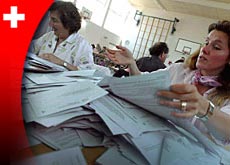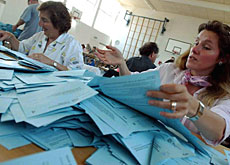Swiss voters deluged with decisions

The Swiss have been voting on nine separate proposals - the highest number in over 130 years - in their regular exercise of direct democracy.
The nuclear power, health costs and disabled rights proposals are likely to produce the closest results.
The number of proposals is the highest to be voted on at a national level in one day since 1866.
Seven of the proposals are people’s initiatives and will need the double majority of the popular vote and the cantons to pass.
The government is recommending seven “no” votes and just two “yes” votes – for revision of the army law and new proposals for civil protection.
Political analyst Hans Hirter says voters are unlikely to be deterred by the fact that there are many more issues than usual on the ballot papers this time around.
“I don’t think the number of issues influences people’s decision to vote,” he told swissinfo.
“Those who are interested in politics will vote, and those who aren’t, won’t.”
Hirter expects a turnout of between 40 and 50 per cent – an average for national votes.
Close call
A couple of the issues in particular are likely to produce a tight finish.
Of the two nuclear proposals being put to the vote, Hirter thinks the call to extend the moratorium on building new power plants stands the greatest chance of being passed.
He says the power of the nuclear lobby and Switzerland’s reliance on nuclear energy to meet around 40 per cent of the country’s electricity needs could help sway the vote.
” I think the vote will be very close as we have already had a moratorium and many people may want to see that extended,” he said.
“As for as the proposal to shut down nuclear power plants, I think there will be a majority against.”
Hirter also expects a close outcome on the issue of whether to force the government to guarantee the country’s 700,000 disabled access to public buildings and transport.
Moral and financial considerations
The government maintains a “yes ” vote would break both federal and cantonal budgets.
But Hirter says when it comes to voting, the argument about costs could lose out to the moral one of giving the disabled the same rights as the rest of society.
“It’s not easy to speculate on the outcome, but people may decide to vote according to their hearts rather than their wallets,” he said.
“There are a lot of things that cost vast amounts of money, and people may decide this is one of the things they are willing to see financed.”
Health costs
Proposals backed by the Social Democrats to change how health insurance premiums are calculated is one of the more controversial issues being put to the vote on Sunday.
It wants to link premiums to income and personal wealth.
Although Hirter says the proposals have a lot of popular support, he thinks the required overhaul of the health insurance system will probably prove too dramatic for most Swiss.
Government recommendations
With so many issues on the ballot paper, Hirter says the government’s position will certainly influence how some people vote.
He says that studies on voting behaviour show that the Swiss – particularly those who are less well informed on an issue – tend to follow the government’s advice.
“They’ll look at what the party they support has to say and at what the government is recommending, and often they’ll use that as a guide to how they should vote.
“But if they have strong views on a subject, the influence of the government’s stance is far weaker.”
The government is opposed to seven of the recommendations being put to the vote on May 18, and has urged the Swiss to vote “no”.
The other issues being put to a vote on Sunday include fairer rents, car-free Sundays, the right to apprenticeships and revision of the army law.
swissinfo, Jonathan Summerton
Issues included on the May 18 ballot paper:
Equal rights for the disabled.
Extending the moratorium on building and upgrading nuclear plants.
Closing down of nuclear power stations.
Revision of the health law.
Improved rights for tenants.
Car-free Sundays.
Right to apprenticeships.
Revision of the army law.
New proposals for civil protection.

In compliance with the JTI standards
More: SWI swissinfo.ch certified by the Journalism Trust Initiative


You can find an overview of ongoing debates with our journalists here . Please join us!
If you want to start a conversation about a topic raised in this article or want to report factual errors, email us at english@swissinfo.ch.